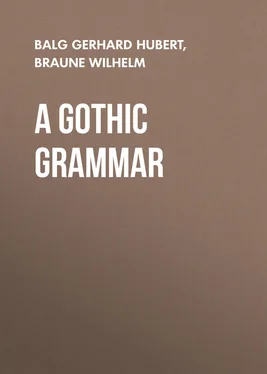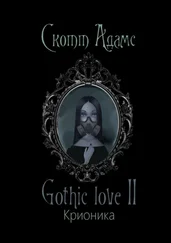Note 2. In Gothic names Latin writers employ efor Gothic ê: Sigismêres, Gelimêr, Reccarêd; besides, as erly as the 6th century, quite regularly also i; as, Theodemir, Valamir. Cp. Beitr., 11, 7 et seq.; Wrede, Wand., 92 et seq.
§ 7. Goth. ê(which regularly corresponds to OHG. and OS. â; ahd. gr., § 34) is found:
(a) in reduplicating verbs, in part with the ablaut ô( §§ 179. 181): grêtan, lêtan, slêpan; (b) in the prt. pl. of the IV. and V. ablaut-series: sêtum(inf. sitan, to sit ), nêmun(inf. niman, to take ), têmum(inf. timan, to befit ), êtum(inf. itan ), and in the prt. sg. frêt; Luc. XV, 30 ( § 176, n. 3); (c) in derivativs from the verbal stems givn under (b); as, andanêms, agreeabl ; andanêm, a receiving ; gatêmiba, becumingly ; uzêta, manger ; (d) in other words; as, jêr, year ; qêns, wife ; mêna, moon ; lêkeis, fysician ; mêrjan, to preach ; manasêþs(' man-seed '), world , etc.; (e) in formativ syllabls: fahêþs, joy ; awêþi, flock of sheep (cp. however § 17, n. 1); azêts, easy ; 2nd pers. sg. prt. of wvs., -dês( nasidês, § 184); (f) final: in the ending of the gen. pl.; as, dagê; in monosyllabic instrumentals: þê, ƕê( §§ 153. 159); in particls and advs.; as, swê, untê, hidrê, bisunjanê; lastly, in the dativs ƕammêh, ƕarjammêh, ainummê-hun(cp. §§ 163-166).
Note 1. êbefore vowels appears as ai; s. § 22.
Note 2. eioccurs quite often for ê, especially in the Gospel of St. Luke; as, qeins(= qêns), faheid(= fahêd), fraleitais(= fralêtais); Lu. II, 5. 10. 29; afleitan; Mt. IX, 6, etc.
Note 3. Sporadically also ifor ê; so, frequently, in the Gospel of St. Lu.; as, birusjôs; Lu. II, 41; qiþeina; VIII, 56. IX, 21; tawidideina; VI, 11; duatsniwun; Mk. VI, 53. Only iis found in wriþus, herd ; Lu. VIII, 33 (for wrêþus; cp. Bezzenb. Beitr. 3, 114).
Note 4. Reversely, also eoccurs for iand ei( § 10, n. 5; § 17, n. 1). – These deviations (in ns. 2-4) seem due to East Gothic writers; cp. Wrede, 'Ostg.', 161.
§ 8. From the preceding êmust be separated the êof sum Gothic words in which it corresponds to OHG. ea, ia (not â): hêr, here ; Krêks, Greek ; fêra, side , region ; mês, table . Cp. ahd. gr., §§ 35. 36; Beitr., 18, 409 et seq.
§ 9. Gothic i, as a rule, denotes the short vowel i[as in E. it], while its corresponding long sound is represented by ei[= ie in E. believ]; s. § 16.
Note 1. The iin Greek words stands for short ι, only exceptionally for η which is generally represented by ê; e. g., Aúnisimus, Ὀνήσιμος; Biþania, Βηθανία.
Note 2. iin Gothic words is long, when it is incorrectly employd for ê(cp. § 7, n. 3).
§ 10. The Gothic i, from an historical point of view, is of two kinds: It represents two originally distinct sounds which, from a purely Gothic standpoint, can not be separated.
(a) Goth. i= proethnic Germanic e (OHG. ë or i; cp. ahd. gr., §§ 28-30), as in the prs. tense of verbs of the III. – V. ablaut-series ( §§ 32-34): niman, OHG. nëman; giban, OHG. gëban; giba, OHG. gëba; bindan, OHG. bintan; itan, to eat ; midjis, ' medius '; hlifan, to steal ; swistar, OHG. swëster; fidwôr, four ; gifts, gift ; -qiss, speech ; the pps. of the V. ablaut-series: gibans, itans, lisans, wigans, qiþans.
(b) Goth. i= proethnic Germanic i (OHG. i; ahd. gr., § 31); e. g., lists, stratagem ; fisks, fish ; is, he ; wissa, I knew ; skritnan, to rend (intr.); prt. pl. and pp. of the verbs of the I. ablaut-series ( § 30): bitun, bitans(inf. beitan); stigun, stigans(inf. steigan); liþun, liþans(inf. leiþan).
Note 1. Final ioccurs in ni, bi, si, hiri; in the nominativs of feminin and neuter j-stems: bandi( § 96), kuni( § 93); in the acc. and voc. sg. of the masculin j-stems: hari( § 90); 3d pers. sg. prt. opt.: nêmi. This final iappears as j, when it becums medial ( § 45).
Note 2. Final ibefore a following iof an enclitic word is elided in nist(= ni-ist), sei(= si-ei), niba(= ni-iba).
Note 3. Every ibefore hand ris broken to aí; cp. § 20.
Note 4. ijis found in ija, ' eam '; þrija, ' tria '; fijan, to hate ; frijôn, to luv ; sijum, we ar ; kijans, germinated , etc. ifor ijis rare: fian, sium, etc., but friaþwa(beside frijaþwa), luv , occurs very often.
Note 5. Occasionally etakes the place of i; as, usdrebi; Mk. V, 10; seneigana; I. Tim. V, 1.
Note 6. For iin the difthong iu, s. §§ 18. 19.
Note 7. For a separation of the two is (= OHG. ë and i) in East Gothic names, s. Wrede, 'Ostg.', 162.
§ 11. The Gothic character oalways denotes a long close oapproaching sumwhat the sound of û(= o in E. home).
Note 1. In Greek words o, as a rule, corresponds to ω, rarely to ο; e. g., Makidonja, Μακεδονία; it also stands for ου: Iodas, Ἰούδας; Lu. III, 26.
Читать дальше











